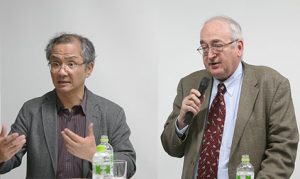
オーディオ
ダウンロード
場所
Deutsches Institut für Japanstudien
Jochi Kioizaka Bldg. 2F
7-1 Kioicho
Chiyoda-ku, Tokyo 102-0094
Japan
アクセス
登録情報
The event is held in English.
After the presentation and the comment there will be time for Q&A and networking.
Admission is free.
Please register via forum@dijtokyo.org.
Victimhood Nationalism in the Transnational Memory Space
2016年11月10日 / 18時半~20時
Jie-Hyun Lim, Sogang University Seoul
Andrew Horvat, Josai International University
‘Victimhood nationalism’ is a working hypothesis to explicate competing national memories over the historical position of victims in coming to terms with the past. The hereditary memory of victimhood consolidates the national solidarity beyond generations and justifies nationalism by endowing the victimized nation with the moral sympathy and historical authenticity. Without a reflection on victimhood nationalism, the postwar Vergangenheitsbewaeltigung (‘coming to terms with the past’) cannot be properly grasped. Victimhood nationalism is intrinsically transnational since victims are unthinkable without victimizers. The transnationality of victimhood nationalism demands a histoire croisée to comprehend the entangled past of the victimized and victimizers. A transnational history of ‘coming to terms with the past’ would show that the vicious circle of victimhood nationalisms, based on the antagonistic complicity of nationalisms between the victimizers and victims, has been a rock to any historical reconciliation effort. The talk will focus on a transnational history of victimhood nationalism in Korea, Poland, and Israel with Japan and Germany as counterparts.
Jie-Hyun Lim is Professor of Transnational History and founding director of the Critical Global Studies Institute at Sogang University in Seoul. He initiated the ‘flying university of transnational humanities’ as the transnational academic venture for doctoral students and young researchers over the globe. Most recently he published five volumes of the Palgrave series of ‘mass dictatorship in the 20th century’ as the series editor and co-edited The Palgrave Handbook of Mass Dictatorship. He is the president of the ‘Network of Global and World History Organizations’ in 2015-2020 and a trustee of the Toynbee Prize Foundation. He held visiting appointments at Cracow Pedagogical University, Warsaw University, Harvard-Yenching Institute, Nichibunken, EHESS, Paris II University and Wissenschaftskolleg zu Berlin. His present research topic is transnational memory and nationalism.
Andrew Horvat is Professor in the Department of International Humanities and Vice-Director of the Global College Program at Josai International University. He previously held positions as Program Director and Instructor at Stanford University`s Kyoto Centre, as Visiting Professor at Tokyo Keizai University, and as Japan Representative of the Asia Foundation. His publications in English include Sharing the burden of the past: legacies of war in Europe, America, and Asia (2003) and Open up, Japan! (1998). His research interests focus on different aspects of experiences and memories of World War Two in East Asia, Europe, and the United States.
The talk by Professor Lim will be followed by comments by Professor Horvat before the floor will be opened to the audience for a Q&A session.